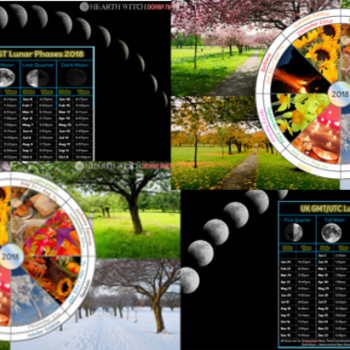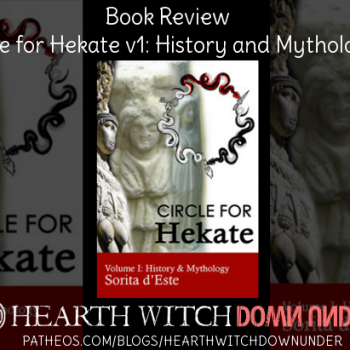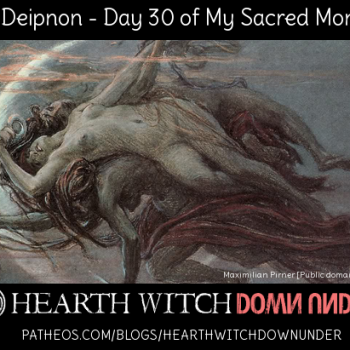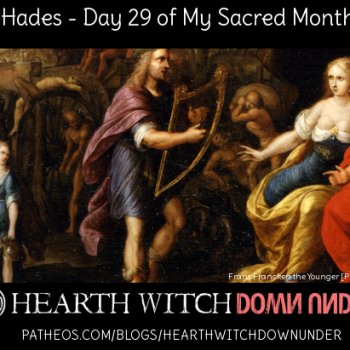It’s increasingly common to come across some piece of fiction that is not necessarily aimed at Pagans or Polytheists or the like, but uses elements from our various religions and mythologies and even lifestyles, and so should be very appealing to us. But, they are so frustratingly inaccurate that you are sitting in a state of perpetual cringe and flinch whilst viewing or reading that fiction.
You probably already have a list of such fictions floating to the top of your mind as you read this – but in case you don’t… I am talking about things like the Percy Jackson books and movies, the old and new Clash of the Titans and Wrath of the Titans, the movie I reviewed earlier this year, Gods of Egypt, movies like How to Train Your Dragon and the companion TV show and of course the ever popular TV show Supernatural. And we can’t forget every portrayal of the “Greek” hero Hercules and of course Xena the Warrior Princess! We can even count things like the Tinkerbell movies, with their popular but so very inaccurate portrayal of fairies – teaching kids everywhere that fairies are wonderful helpful little creatures and surely no danger to us.
I know some Pagans and Polytheists are completely against all of this sort of fiction – they should not even exist because they teach everyone false stuff, and since they do exist most definitely never ever let your kids partake of these fictions. I get the sentiment, truly I do. A lot of people do watch and read these fictions and think they know the realities of our religions and mythologies – obviously they know very little about any of it at all. These things are not reliable sources of information of our religions and mythologies.
But that doesn’t make them useless.
I discussed this briefly in my post on Pagan parenting without indoctrination, that I personally think that inaccurate fictional portrayals of our religions and mythologies can be helpful to us, especially in regards to our kids, but also for us adults as well.
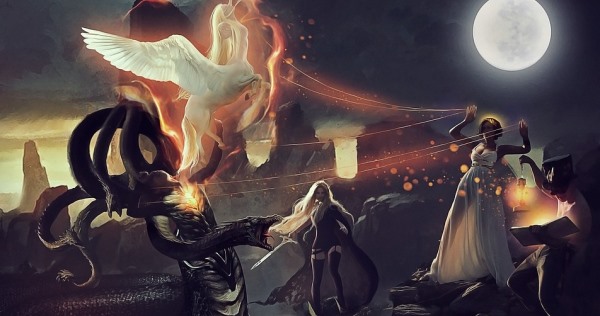
Appreciate the Reality
One thing I have learned is that a bad version of something good really makes you appreciate the original so much more. For me, this occurs most notably with Lord of the Rings, which isn’t Pagan fiction obviously, but it’s my favourite book, the book that got me to love reading. The movies? I hate them with a passion. I know they are good movies, I can recognise how amazing they are, but I hate them so much. I hate them because I love the books so much. And the movies just make me love the books even more than I used to.
The same happens with our mythologies and religions. We know what the real versions are (we better anyway) and when confronted with terrible messed up versions of them in movies and books, our love for the original versions only grows that much deeper.
When we are confronted with an evil Hades in a movie, jealous of Zeus and always at war with the other Gods (what the hell is with that trope anyway?) we appreciate the reality of Hades so much more. Aphrodite as a moronic, vapish idiot in a TV show really makes us love the real version of Her so much more.
While you can appreciate what you have at any time – your appreciation of reality is that much higher when faced with the awful alternative.
Comparison for Memorisation
I, personally, find that comparing one version of something to another makes it much easier to remember the true facts of a thing. Comparative studies are handy for remembering things – because if you have trouble remembering something, all you need to think of is that time when you had to compare it something else, and suddenly the memory returns (doesn’t always work, but a lot of the time it does).
Of course, this isn’t so true for those who have trouble remembering which version is which. If you have to think hard to remember which religion Hercules is from (He’s Roman, not Greek as our entertainment industry so often relays), then this may not be a good method for you.
Plumb the Depths
Another facet of comparing one version of something to another is that it can often lead you into deeper areas than you might normally go. It can also lead to a deeper understanding of something you already knew.
They do this in some media study classes – you read a book and then you watch the movie adaptation and you compare the two. Where do they match and where do they differ? Looking deeply into this you can start to see how important some of the little things really are – things you never really paid much attention to before, but when those little things are removed or changed, they also change the whole story or the meaning behind the story.
You also may begin to wonder as to why the story was changed in certain ways. By looking into the why of such changes we again can discover deeper meanings behind the originals, and we can also discover something about ourselves and other people along the way. This can be helpful on many levels, but one that may be of interest to Pagans and Polytheists – especially recons – is the sociological differences between how people view these mythologies now and how they viewed them long ago. What has changed from that society to this one? Why is this now taboo when it wasn’t then? And so on.
Have a Bit of Fun
I honestly really like the Xena and Hercules TV shows, for the most part (until Christianity is made to be the good guy, ugh). They are B-grade shows, they are made to be ridiculous, funny and wrong. That’s how they are supposed to be and that’s how I take them – for what they are. I kind of see them as the modern day versions of the ancient comedies that, really, do make fun of the Gods and heroes and whatnot.
Which leads me to wonder about those Polytheists who get so angry with Xena and Hercules because they make fun of the Gods – when they are quite happy to partake of ancient comedies that do the same thing. If you hate the shows because you think they’re crap – that’s fine. But if you hate them because they do what the comedies and plays you love so much do, then you might need to ask yourself why that is? What is the difference?
Know Thine Enemy
This is the world we live in now, these fictions can help us to see some of the views and opinions of us that we are going to have to face. Supernatural is a good example of the way people think about our “supernatural” religions, evil that can be beaten with Christian ideals.
I’m not saying that Christianity or Christians are our enemies, so much as I am saying that the Christianised worldview, especially the view of us and our beliefs, that is our enemy. How can we understand the way people view us and our religions, if we aren’t willing to look at the way they portray us and our religions? And if we do not understand how and why they view us this way, then we can’t fight it and try to help people view us in another, better, more realistic way.
It’s not just the world views that Supernatural and other shows can show us either. Consider the demon Sam Hain…. Or True Bloods Sam-hi-ain. Dear Gods, why is it so hard for these people to Google and find out how to pronounce things? But that’s the thing, people don’t Google what is easy to Google and when TV and movies mess up these little things – we learn what a large majority of people are also going to mess up. We can be prepared for the inane questions, misconceptions and mispronunciations that are thrown our way.
We don’t have to like all of these fictional portrayals of our religions, mythologies, lifestyles and communities – but even in our dislike of them, we can still use them to our advantage in some way. We just need to let go of our initial outrage, and look a little deeper.







